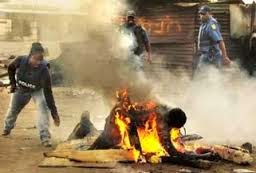Darfur Genocide ( 2003- present)
Location
Historical background
They gained their independence from the UK in 1956, then for the remainder of the 20th century they had 2 civil wars. International interest became involved when oil was discovered in Darfur. War between North and South ended in 2005, but Darfur was not apart of the peace agreement. Darfur remains underdeveloped compared to the rest of Sudan, because of this, allegations started that the government was arming the Arab Tribes (Janjaweed) to raid non Arab villages. This rumour cause the threatened non Arabs to attack the Sudan airforce base. These events were the beginning of the genocide.
Important Dates
Important Dates
In early 2000, the UN ordered a mission to maintain peace in Darfur. It was planned that 26,000 troops were to be sent but only 9,000 were sent. In February 2003 two rebel groups, the Sudan Liberation Army and the Justice and Equality Movement drawn from members of the Fur, Masalit, and Zaghawa ethnic groups, demanded an end to chronic economic marginalization and sought power-sharing within the Arab-ruled Sudanese state. They also sought government action to end the abuses of their rivals, Arab pastoralists who were driven onto African farmlands. In September 2004, President George W. Bush declared the crisis in Darfur a "genocide".
Nations/Groups/Individuals involved
Janjaweed (Arab Militia Group) funded by the government to ethnically cleanse Darfur on Non- Arab groups. Darfuri men, women, and children were also involved as they are the victims of this genocide.Reasons and means of promotion for the genocide
Religious differences and hatred towards the Darfuri people promoted the genocide. However, the attacks on the Sudan Air base gave the initial reason for the government to begin attacks.
Important dates/ events that occurred during the genocide
As a result, 100,000 people fled their homes in Darfur in the first week of March, bringing the total number of newly displaced persons to 120,000 in 2014. These alarming numbers are on top of the 460,000 people displaced by violence in 2013, the highest number since the height of the genocide in 2004. The U.N. estimates that 300,000 Darfuris have died since 2003, but it hasn't bothered to estimate casualty numbers since 2008. With fighting continuing to this day, the number is likely to be far higher.Atrocities committed
The violence had spread over the border to Chad with the same devastating effect. Innocent civilians died at the hands of factions, countless women and girls were raped and murdered without mercy, large numbers of men were tortured or killed, while children suffered severely from malnutrition and violence.
Numerous assaults have resulted in decimated small farming communities. Everything that can sustain life such as livestock, food stores, wells, blankets or clothing had been looted or destroyed. Villages were torched systematically, often not just once, but rather twice. The uncontrolled presence of Janjaweed units in the burned countryside and in abandoned villages has driven civilians into refugee camps and improvised settlements outside of the larger towns.
Atrocities Committed
The Janjaweed systematically destroyed Darfurians by burning villages, looting economic resources, polluting water sources, and murdering, raping, and torturing civilians. These militias are historic rivals of the main rebel groups, the Sudanese Liberation Movement , and the Justice and Equity Movement. As of today , over 480,000 people have been killed and over 2.8 million people are displaced.
Criminal Charges/ War Crimes tribunals
-On March 4th 2009 the international criminal court ordered a warrant for arrest against Omar Bashir for crimes against humanity and.
-In july 2010 a warrant for arrest on charges of genocide were also placed upon Bashir. The government of Sudan has not yet turned Bashir to the ICC
-Since the order of the arrest, Sudan has seen an increase in crime and protest.
-Sudan is strongly backed by China and Russia who oppose the peacekeeping of the UN and continues to supply the Sudanese military with weapons and helicopters. Russia considers Sudan an important global ally in the international world especially as a part of Africa.
Current status of the Nation
In 2003, after decades of neglect, drought, oppression and small-scale conflicts in Sudan's western region of Darfur, two rebel groups mounted an insurgency against Sudan's central government. In response, the regime of Sudanese President Omar al-Bashir and its allied militia, known as the Janjaweed, launched a campaign of destruction against civilians of similar ethnic background as the rebels. This campaign wiped out entire villages, destroyed food and water supplies, and systematically murdered, tortured and raped thousands of Darfuris. In September 2004, President George W. Bush declared the crisis in Darfur a "genocide". Despite the world's outcry, the violence continued and in recent years has spread to other states in Sudan.
Finally, in July 2007 the United Nations agreed to pass Resolution 1769 which authorized the deployment of 26,000 peacekeeping forces in Darfur. The foundations for Darfur Peace Agreement were set and in 2011 it was reached in Doha. A peace agreement was signed between the two sides - the Government of Sudan and the Liberation and Justice Movement.




No comments:
Post a Comment